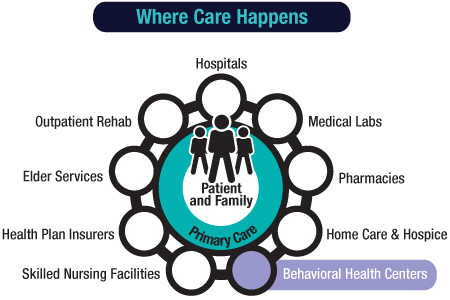
Treating the whole person
Behavioral and mental health services are broad fields with specific focuses respectively. Behavioral health addresses a patient’s patterns of behavior and the impact that these have on the mind and body, this can include issues of substance abuse. Mental health services focus on a patient’s general state of mind with a view to optimal mental health. Treatment can include talk or group therapy to address issues of depression, anxiety, grief, age or health related mental illness.
Behavioral and mental health services are important parts of patient-centered care, and these services are changing rapidly to attempt to increase accessibility and focus on preventative and community services.
Career opportunities in behavioral and mental health can include:
- Direct Care Assistants (Free training is currently available for direct care assistants)
- Mental Health and Substance Abuse Social Worker
- Certified Nursing Assistants (CNAs)
- Registered Nurses (RNs)
- Substance Abuse and Behavioral Disorder Counselors
- Community Health Workers
Mental and behavioral health professionals work with people of all ages and backgrounds. In order to prevent behavioral and mental problems, professionals working in this field often serve as a referral point or bridge to other social services, such as housing, nutrition, or other support.
These services can be delivered in a variety of settings:
- Individual offices (like that of a psychiatrist or professional counselor), in managed care organizations and health plans, or in clinical settings, such as hospitals.
- Behavioral health hospitals that offer specialized, inpatient care, as well as residential and outpatient treatment programs.
- Community settings that often serve as a link between health services and social services in a very holistic model of care.
Learn more about behavioral health and hear behavioral health workers share their career journey.
 Healthcare Workforce Partnership
Healthcare Workforce Partnership  REB - REGIONAL EMPLOYMENT BOARD OF HAMPDEN COUNTRY, INC.
REB - REGIONAL EMPLOYMENT BOARD OF HAMPDEN COUNTRY, INC.